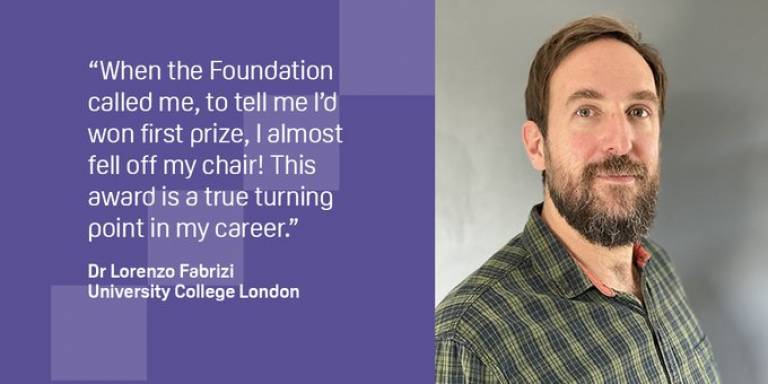Dr Lorenzo Fabrizi NPP Wins 1st Place Emerging Leaders Prize of £100k
5 November 2020
Medical Research Foundation - Emerging Leaders Prize celebrates outstanding pain researchers

Alleviating pain in babies and preventing pain after whiplash injury in adults are just two of the research challenges being tackled by winners of this year’s Medical Research Foundation Emerging Leaders Prize, announced today [Thursday 5 November 2020].
2020’s Emerging Leaders Prize awards £200,000 to outstanding scientists from University College London, the University of Oxford, and King’s College London, who are all working in the field of pain research.
Pain affects around 28 million people in the UK, which is around two-fifths of the UK population. The most common types of chronic pain include musculoskeletal pain such as arthritis and back pain, with women more likely to experience chronic pain than men.
Pain is not simply a symptom of disease, but has a biology that is important to understand due to its wide-ranging effects on quality of life; impacting on the daily activities of vast numbers of people.
Chronic pain is not only expensive at an individual level, but it also carries a large societal and economic burden by putting extra strain on healthcare systems, as well as contributing to unemployment and work absence due to sickness. Chronic pain costs the UK economy billions of pounds every year, with back pain alone estimated to cost £10 billion.
Despite the personal, societal and economic burden imposed by pain, there is still a significant gap in our understanding - in particular, anticipatory care of pain, understanding of pain in children and adolescents, managing co-morbidities in patients with pain (those who may have more than one condition) and public health strategies to deal with pain.
We also need a better understanding of molecular mechanisms involved in the experience of both acute and chronic pain, which means studying both the body’s biological pathways leading to pain but also developing new treatment options.
Angela Hind PhD, Chief Executive of the Medical Research Foundation, said: “Investing in new pain research is critical for improving our understanding of the conditions that blight many millions of people’s lives, and to help develop new treatments aimed at alleviating pain. Understanding how people respond differently to pain is crucial for lowering pain’s psychological, social and economic burden, and we’re excited to be supporting the next generation of research leaders to tackle these important issues.”
1st place, £100,000 prize
Dr Lorenzo Fabrizi, University College London (UCL)
Many infants need invasive neonatal care at birth, either because they have been born prematurely or because they are unwell. Pain is inevitable, the burden is immense, and the consequences can last for many years.
Dr Fabrizi’s work aims to understand how the neonatal brain processes pain, and the longer-term impact of pain. Using advanced brain imaging techniques, he has shown that the way the preterm brain processes pain dramatically changes with age and is different from the way that we process it as adults. This means that infants may not feel pain in the same way as adults, and that we cannot use common behaviours, like crying, to predict pain intensity.
Discoveries made by Dr Fabrizi, a Principal Research Fellow at UCL, have paved the way for a ‘brain-led’ approach to studying pain in babies, and opened new avenues of research to his own trainees and other groups in the UK and around the world.
Using mice as an experimental model, Dr Fabrizi will study early development of networks in the brain that are responsible for processing pain, which is important for understanding when the neuronal architecture that allows babies to feel pain is fully developed. It is not possible to study this in humans, and insights from Dr Fabrizi’s research in animals could have vast clinical benefits – including the development of targeted treatments aimed at alleviating pain, especially in premature babies.
Dr Fabrizi said: “When the Foundation called me, to tell me I’d won first prize, I almost fell off my chair! This award is a true turning point in my career. I had hit a wall in the interpretation of brain imaging of human preterm neonatal pain, as we had concurrent results that did not clearly fit together. This project will allow me to start a new line of models of preterm pain in order to understand the developmental biology underpinning my observations in humans.”
 Close
Close

